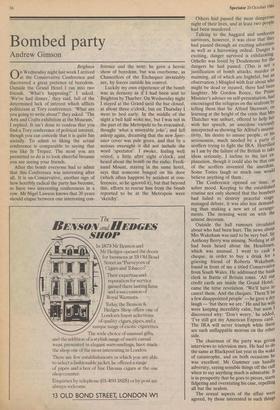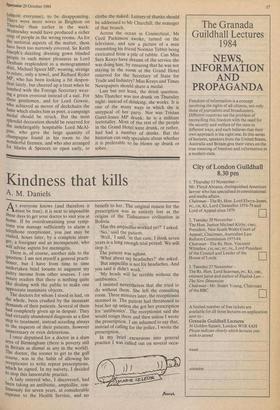Bombed party
Andrew Gimson
Brighton On Wednesday night last week I arrived at the Conservative Conference and discovered a great pretence of boredom. Outside the Grand Hotel I ran into two friends. 'What's happening?' I asked. `We've had dinner,' they said, full of the determined lack of interest which afflicts politicians at Tory conferences. 'What are you going to write about?' they asked. 'The Arts and Crafts exhibition at the Museum,' I replied. It isn't done to confess that you find a Tory conference of political interest, though you can concede that it is quite fun socially. To admit to liking the actual conference is comparable to saying that you like St Tropez. The most you are permitted to do is to look cheerful because you are seeing your friends.
After the bomb everyone had to admit that this Conference was interesting after all. It is un-Conservative, another sign of how horribly radical the party has become, to have two interesting conferences in a row. Mr Nigel Lawson knows that 20 years should elapse between one interesting con- ference and the next: he gave a heroic show of boredom, but was overborne, as Chancellors of the Exchequer invariably are, by forces outside his control.
Luckily my own experience of the bomb was as derisory as if I had been sent to Brighton by Thurber. On Wednesday night I stayed at the Grand until the bar closed, at about three o'clock, but on Thursday I went to bed early. In the middle of the night a bell half woke me, but I was not in the part of the Metropole to be evacuated, thought 'what a miserable joke', and fell asleep again, dreaming that the new Spec- tator cover was pale green, and that by a serious oversight it did not include the word 'spectator'. I awoke, feeling well rested, a little after eight o'clock, and heard about the bomb on the radio. Ferdi- nand Mount, staying in the same hotel, says that someone banged on his door (which often happens by accident at con- ferences, so he ignored it), but that beyond this, efforts to rescue him from the bomb reported to be at the Metropole were 'sketchy'. Others had passed the most dangerous night of their lives, and at least two people had been murdered. Talking to the haggard and unshaven survivors, however, it was clear that they had passed through an exciting adventure as well as a harrowing ordeal. Danger Is exciting, danger survived is exhilarating. Othello was loved by Desdemona for the dangers he had passed. (This is not a justification of bomb attacks, murder or maiming, all of which are frightful, but an observation.) Mingled with fear about who might be dead or injured, there had been laughter. Mr Gordon Reece, the Prime Minister's adviser on self-presentation, had encouraged the refugees on the seafront by telling them that Sir Alfred Sherman, on learning at the height of the crisis that Mrs Thatcher was unhurt, offered to help her with her speech, an anecdote variously interpreted as showing Sir Alfred's insensi- tivity, his desire to amuse people, or his seriousness, much needed by a party of scoffers trying to fight the IRA. Horrified as I am by the failure of the British to take ideas seriously, I incline to the last ex- planation, though it could also be that one of the scoffers invented the anecdote. Some Tories laugh so much one would believe anything of them. The Conference opened on time, in sober mood. Keeping to the established routine not only showed that the bombers had failed to destroy peaceful stage- managed debate, it was also less demand- ing than making a new set of arrange- ments. The morning went on with the utmost decorum. Outside the hall rumours circulated about who had been hurt. The news about Mrs Wakeham was said to be very bad. Sir Anthony Berry was missing. Nothing at all had been heard about the Heseltines, which was unusual. I went to cash a cheque, in order to buy a drink for a grieving friend of Roberta Wakeham, found in front of me a titled Conservative from South Wales. He addressed the bank clerk in Battle of Britain tones. 'All our credit cards are inside the Grand Hotel,, came the terse revelation. 'We'll have to cancel them. And the cheques. There'll be a few disappointed people' — he gave a dry laugh — tut there we are.' He and his wife were keeping incredibly calm, but soon I discovered why: 'Don't worry,' he added: `I've still got my American Express card. The IRA will never triumph while there are such unflappable morons on the other side.
The chairman of the party was giving interviews to television men. He had to do the same at Blackpool last year in the wake of catastrophe, and on both occasions he was excellent. Mr Gummer can handle adversity, saying sensible things off the cuff when to say anything much is admirable. It is in prosperity that he goes to pieces, starts fidgeting and overstating his case, repelling all but the zealots.
The sexual aspects of the affair were agreed, by those interested in such things (almost everyone), to be disappointing. There were more wives in Brighton on Thursday than earlier in the week: Wednesday would have produced a richer crop of people in the wrong rooms. As for the sartorial aspects of the matter, these have been too narrowly covered. Sir Keith Joseph's dazzling dressing gown blinded people to such minor pleasures as Lord Denham resplendent in a monogrammed shirt, Michael Spicer MP, wearing, strange to relate, only a towel, and Richard Ryder MP, who has been looking a bit despon- dent lately, but cheered up a treat when he lunched with the Foreign Secretary wear- ing a green overcoat instead of a suit. For these gentlemen, and for Lord Gowrie, who achieved as mover of deckchairs the fame which eludes him as poet, a campaign medal should be struck. But the most splendid decoration should be reserved for the indefatigably hospitable Lord McAl- Pine, who gave the large quantity of Champagne found in his room to the wonderful firemen, and who also arranged for Marks & Spencer to open early, to clothe the naked. Letters of thanks should be addressed to Mr Churchill, the manager of that branch.
Across the ocean in Connecticut, Mr Cecil Parkinson awoke, turned on the television, and saw a picture of a man resembling his friend Norman Tebbit being extricated from a pile of rubble. Can Miss Sara Keays have dreamt of the service she was doing him, by ensuring that he was not staying in the room at the Grand Hotel reserved for the Secretary of State for Trade and Industry? Miss Keays and Times Newspapers should share a medal.
Last but not least, the drink question. Mrs Thatcher was not drunk on Thursday night: instead of drinking, she works. It is one of the many ways in which she is untypical of her party. Nor was Tristan Garel-Jones MP drunk: he is a militant teetotaller. Most of the rest of the people in the Grand Hotel were drunk, or rather, had had a number of drinks. But the historian can only speculate about whether it is preferable to be blown up drunk or sober.



















































 Previous page
Previous page